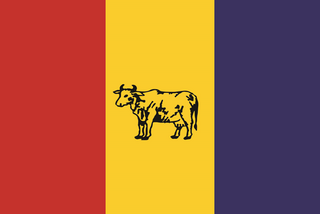
The Nepali Congress is the oldest democratic socialist political party in Nepal and the largest party in the country. The party has 870,106 members as of the party's 14th general convention in December 2021 making them the largest party by membership in Nepal. In June 2023, the party started online membership since the emergence of youth leaders in vital post to bring youths into the party. The party is led by former prime minister, Sher Bahadur Deuba since the party's thirteenth general convention in 2016. The party won 89 seats in the 2022 general election and is currently the largest parliamentary group in the House of Representatives.

The Communist Party of Nepal (Unified Marxist–Leninist) (Nepali: नेपाल कम्युनिष्ट पार्टी (एकीकृत मार्क्सवादी-लेनिनवादी), romanized: nēpāl kamyuniṣṭ pārṭī (ēkīkṛt mārksavādī-lēninavādī); abbr. CPN (UML)) is a communist political party in Nepal. The party emerged as one of the major parties in Nepal after the end of the Panchayat era.

Sher Bahadur Deuba is a Nepali politician and former prime minister of Nepal. He has also been serving as the president of the Nepali Congress since 2016. Deuba has served five terms as prime minister and is the Member of Parliament for the parliamentary constituency of Dadeldhura 1.

Nepal Ratna Girija Prasad Koirala, affectionately known as Girija Babu, was a Nepalese politician. He headed the Nepali Congress and served as the Prime Minister of Nepal on four occasions, including from 1991 to 1994, 1998 to 1999, 2000 to 2001, and 2006 to 2008. He was the Acting Head of State of Nepal between January 2007 and July 2008 as the country transitioned from a monarchy to a republic.

The Rastriya Prajatantra Party is a constitutional monarchist and Hindu nationalist political party in Nepal.

Rashtriya Prajatantra Party-Chand was a Nepalese political party. It was a right-wing pro-monarchy party, formed out of the political elite of the erstwhile Panchayat system.
General elections were held in Nepal on 15 November 1994 to elect the Nepal House of Representatives. The election took place after the previous Nepali Congress government collapsed and King Birenda called new elections. The results showed that the Communist Party of Nepal won the most seats in the House of Representatives and Man Mohan Adhikari became Prime Minister at the head of a minority government.
On November 30, 1994, following the 1994 parliamentary election, the Communist Party of Nepal formed a minority government led by Man Mohan Adhikari. Despite the Nepali Congress securing more popular votes than the Communist Party of Nepal, the latter secured 88 seats to the former's 83. Neither party was successful in forming a coalition to hold a majority of the 205 seats. After failed coalition negotiations, Adhikari became Prime Minister of a minority government, acquiring the support of the Rastriya Prajatantra Party and the Nepal Sadbhawana Party.

Kamal Thapa is a Nepalese politician belonging to Rastriya Prajatantra Party Nepal.

General elections were held in Nepal in two phases on 26 November and 7 December 2017 to elect the 275 members of the fifth House of Representatives, the lower house of the Federal Parliament of Nepal.
Rastriya Prajantantra Party (Samyukta) (Nepali: राष्ट्रिय प्रजातन्त्र पार्टी (संयुक्त)), literally the National Democratic Party (United) and abbreviated RPP (U), was a political party in Nepal. It was formed on 6 August 2017 by Pashupati Shamsher Jang Bahadur Rana after splitting from the Rastriya Prajatantra Party as the Rastriya Prajatantra Party (Democratic). On 31 January 2019, it merged with the Unified Rastriya Prajatantra Party (Nationalist), another splinter group of the Rastriya Prajatantra Party, to form Samyukta.

The First Federal Parliament of Nepal, consisting of the House of Representatives and the National Assembly, was elected via the 2017 legislative, provincial and local elections.

General elections were held in Nepal on 20 November 2022 to elect the 275 members of the House of Representatives. There were two ballots in the election; one to elect 165 members from single-member constituencies via FPTP, and the other to elect the remaining 110 members from a single nation-wide constituency via party-list proportional representation.

The Second Federal Parliament of Nepal, was elected by the 2022 general elections on 20 November 2022. The elections elected 275 Members of Parliament (MPs), 165 for each constituency and 110 through the party list, to the House of Representatives. The parliament convened for the first time on 9 January 2023.
The 2nd Koshi Provincial Assembly was elected through the provincial elections held on 20 November 2022. The assembly has 56 constituency seats in which members are elected through direct elections and 36 proportional representation party list seats. The term of the assembly is 5 years unless dissolved earlier. The first session of the assembly commenced from 1 January 2023.
The second Bagmati Provincial Assembly was elected by the 2022 provincial elections on 20 November 2022. 110 members were elected to the assembly, 66 of whom were elected through direct elections and 44 of whom were elected through the party list proportional representation system. The first session on the assembly commenced from 2 January 2023.
The second Gandaki Provincial Assembly was elected by the 2022 provincial elections on 20 November 2022. 60 members were elected to the assembly, 36 of whom were elected through direct elections and 24 of whom were elected through the party list proportional representation system. The first session of the assembly commenced from 2 January 2023.












